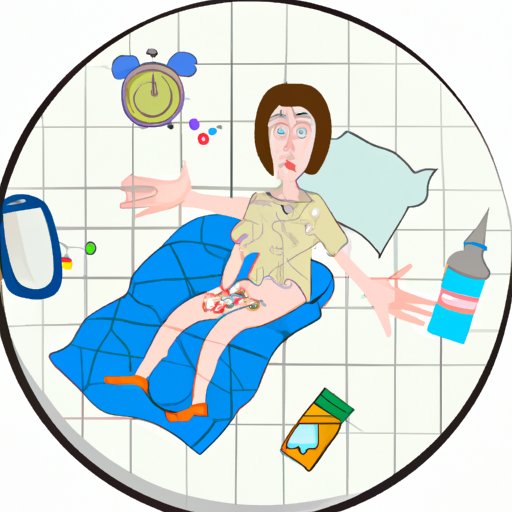Introduction
Adult bedwetting, also known as nocturnal enuresis, refers to involuntary urination during sleep for individuals aged five and older. Although it is more common in children, it can occur in adults as well. In this article, we will explore why adults wet the bed, the effects of this condition, and possible treatments.

Exploring the Causes of Adult Bedwetting
There are several factors that can contribute to adult bedwetting. These include stress, medications, and genetics.
Stress
Stress can be a major factor in adult bedwetting. When we experience high levels of stress, our bodies produce hormones that can interfere with our ability to control our bladder. This can lead to episodes of bedwetting.
Medications
Certain medications can also increase the risk of adult bedwetting. Diuretics, which are used to treat high blood pressure, can cause an increase in urine production. Antidepressants, sedatives, and anti-anxiety drugs can also cause problems with bladder control.
Genetics
Research suggests that genetics may also be a factor in adult bedwetting. It appears that certain genes may make people more prone to bedwetting. Studies have shown that if one parent experienced bedwetting as an adult, then their child is more likely to experience it as well.
Examining the Impact of Stress on Adult Bedwetting
As previously mentioned, stress can be a major factor in adult bedwetting. When we experience high levels of stress, our bodies produce hormones that can interfere with our ability to control our bladder. This can lead to episodes of bedwetting.
Physical Symptoms
Stress can cause physical symptoms such as headaches, fatigue, muscle tension, and difficulty sleeping. These physical symptoms can further contribute to the problem of adult bedwetting.
Emotional Symptoms
Stress can also cause emotional symptoms such as anxiety, depression, and irritability. These emotional symptoms can add to the stress of dealing with adult bedwetting, making the problem worse.

Understanding the Role of Medications in Adult Bedwetting
Certain medications can also increase the risk of adult bedwetting. Diuretics, which are used to treat high blood pressure, can cause an increase in urine production. Antidepressants, sedatives, and anti-anxiety drugs can also cause problems with bladder control.
Impact of Different Types of Medication
Diuretics, antidepressants, sedatives, and anti-anxiety drugs all have different effects on the body. Diuretics can cause an increase in urine production, while antidepressants, sedatives, and anti-anxiety drugs can affect the brain’s ability to control the bladder. All of these types of medications can increase the risk of adult bedwetting.
Possible Side Effects
In addition to increasing the risk of adult bedwetting, these medications can also cause other side effects. Diuretics can cause dehydration and electrolyte imbalances, while antidepressants, sedatives, and anti-anxiety drugs can cause drowsiness, confusion, and dizziness. It is important to discuss any potential side effects with your doctor before starting any new medications.

Investigating the Link Between Genetics and Adult Bedwetting
Research suggests that genetics may also be a factor in adult bedwetting. It appears that certain genes may make people more prone to bedwetting. Studies have shown that if one parent experienced bedwetting as an adult, then their child is more likely to experience it as well.
Role of Heredity
Heredity plays an important role in adult bedwetting. If one parent experienced bedwetting as an adult, then their child is more likely to experience it as well. Additionally, if one sibling experiences adult bedwetting, then other siblings are also more likely to experience it.
Risk Factors
In addition to heredity, there are other risk factors that can increase the likelihood of adult bedwetting. These include a history of urinary tract infections, diabetes, and neurological disorders. It is important to speak with your doctor if you have any of these risk factors.
Exploring Treatments for Adult Bedwetting
If you are experiencing adult bedwetting, there are several treatments available. These include behavioral therapy, medication, and surgery.
Behavioral Therapy
Behavioral therapy is often recommended for adults who experience bedwetting. This type of therapy can help to identify and address underlying issues that may be contributing to the problem. It can also help to develop strategies for controlling the bladder and improving sleep habits.
Medication
In some cases, medications may be prescribed to help treat adult bedwetting. These medications can help reduce the amount of urine produced at night and can also help to improve bladder control.
Surgery
In severe cases, surgery may be recommended. This type of surgery is designed to strengthen the bladder muscles, which can help to reduce episodes of bedwetting.
Examining the Psychological Implications of Adult Bedwetting
Adult bedwetting can have psychological implications, as it can lead to feelings of shame, embarrassment, and guilt. It is important to remember that bedwetting is a medical condition and not something to be ashamed of.
Impact on Self-Esteem
The psychological impact of adult bedwetting can be significant. It can lead to low self-esteem, feelings of embarrassment, and guilt. It is important to remember that bedwetting is a medical condition and not something to be ashamed of.
Coping Strategies
It is important to find healthy ways to cope with the psychological impact of adult bedwetting. Talking to a counselor or support group can help to provide emotional support and allow you to express your feelings in a safe environment. Additionally, finding ways to relax and manage stress can help to reduce episodes of bedwetting.
Conclusion
Adult bedwetting is a medical condition that can have serious physical and psychological implications. There are several factors that can contribute to adult bedwetting, including stress, medications, and genetics. Treatment options include behavioral therapy, medications, and surgery. It is important to seek help from a healthcare professional if you are experiencing adult bedwetting.


